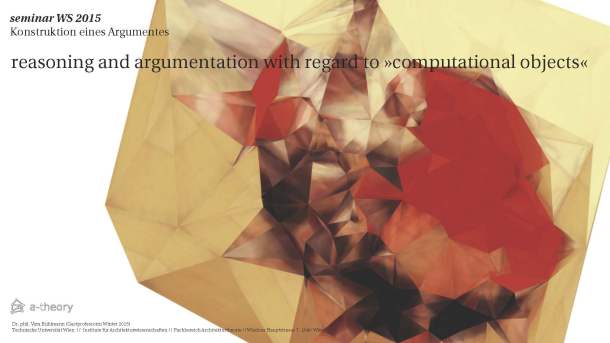Reasoning, argumentation, and »the object« maintain a multiplicitous and unsettled relation within the paradigm of computational modeling: computational models are equally reflective as they are projective, equally analytical as they are synthetic. How to approach this situation? French philosopher Michel Serres has suggested »a communicational apriori« to representation and modeling. In this seminar we will get familiar with Serres’ philosophy of what he calls »the transcendental objective«, and we will explore what it might mean to »argue« and to »reason« with concepts that are, as he suggests, to be conceived of as spectrums rather than forms. We will attempt to extrapolate what this shift in perspective (from form to spectrum) implies for terms central to reasoning like object, type, category, class, generalization, abstraction, scheme, diagram and we will try will ask what might be gained from these considerations for clarifying what is at stake in terms like product, article, one-of-a-kind, generic, etc.
In complementation to this abstract and formal level, we will look at key moments in the history of architectural theory where the architectural object has been addressed in novel manners. We will do so with the speculative assumption that each of those transformations has introduced a novel »apriori« for reasoning in architecture. As preliminary and tentative suggestions e.g.: Vitruv and the »negotiation apriori«, Alberti and the »representation apriori«, Corbusier and the »mobility apriori«.
We will try to identify diverse instances of »computational objects« on various scales in contemporary architecture, and compile them in a lexicon. Every student will choose one such »object« and explore in short presentations to the class, with several iterations over the semester, how it might be addressed best – such that a »reasonable« »argument« can be built around it. The elaboration of a suitable format for such an argument is an overall objective of this course.
FINAL EXAM // As the final work with which students conclude and earn credits for this seminar, they will build a story of their “Argument” around a computational object of their choice.
COURSE MATERIALS // A selection of articles, book excerpts and online lecture will be provided. The weekly preparation of about 20-30 pages will be expected for the participation in the seminar. The lecture class “The computational object in design and in philosophy” will be largely complementary to this seminar; participation in the lecture course is highly recommended, yet not mandatory.
Michel Serres, The Parasite (2007 [1980]) The Parasite
Jean-Luc Nancy, “Myth, Interrupted” (The Inoperative Community, 1986) Jean-Luc-Nancy-Myth-Interrupted-2
Assignment for Nov 10: see doc here: Assignment for Nov 10
Wolfgang Ernst, „Experimenting with Media Temporality“ in: Digital Memory and the Archive, Minnesota University Press 2012. Ernst_Experimenting with media temporality



